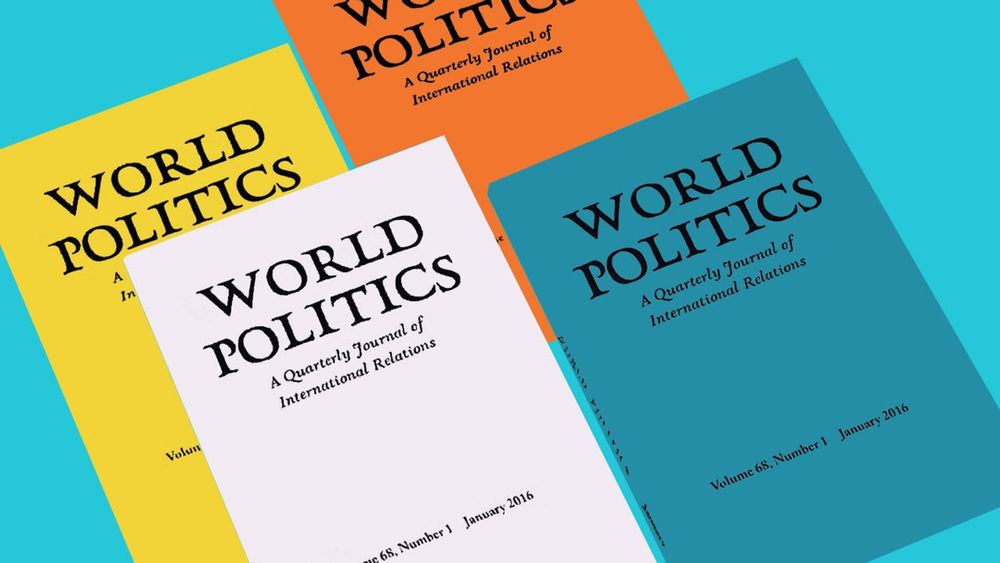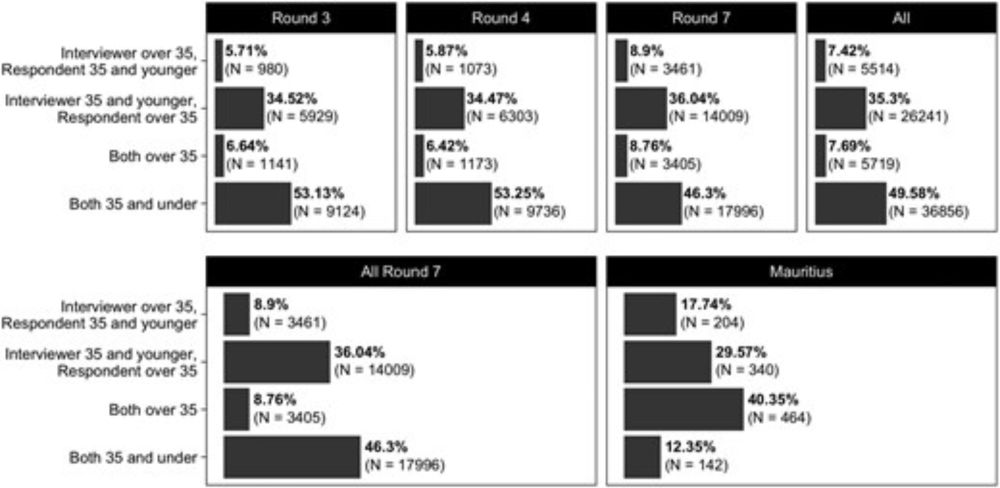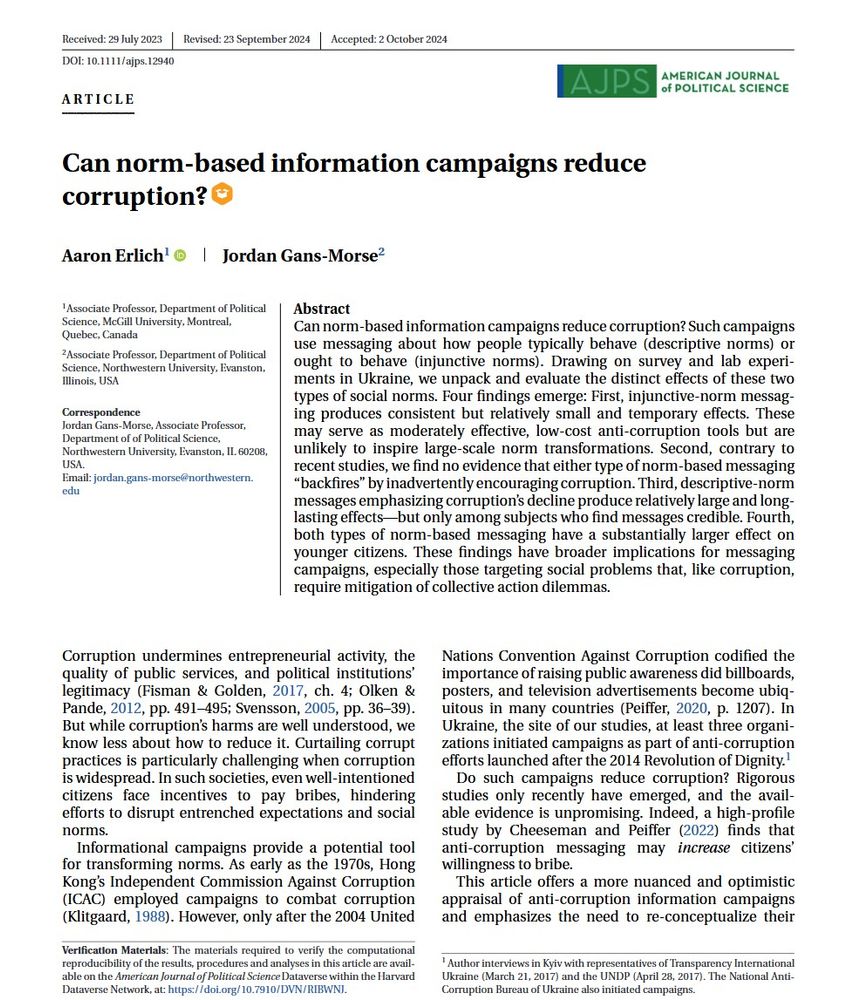Super interesting! I see you haven't gone back to exams or anything like that. Do you think it's sustainable and that students aren't just using LLMs as a massive crutch anyhow?
04.11.2025 03:27 — 👍 0 🔁 0 💬 0 📌 0

Did an access-to-information system in #Mexico work? Did it become more responsive to public requests for information over time, or did portions of the public become more "expert" in their requests, which in turn ensured responses from the system?
16.09.2025 13:22 — 👍 3 🔁 2 💬 1 📌 0

The July issue of @worldpolitics.bsky.social is out! Learn about #DemocraticSocialist #PoliticalParty strategies, participatory institutions, #WealthInequality, #migrants and #socialsecurity coordination, and #Kissinger and #SoftPower. muse.jhu.edu/issue/55120 #Inequality #Capitalism
08.07.2025 13:15 — 👍 9 🔁 4 💬 1 📌 2

Elder, Am I Right? Age-Group Differences in Social and Political Interactions in Africa
Abstract. Age-group differences play an essential role in social interaction across sub-Saharan Africa. However, the social effects of these differences re
I am super excited that this article about how age differences in the survey enumeration process might influence survey results in Sub-Saharan Africa bit.ly/3DUSh3m. Using @afrobarometer.bsky.social data, I show they do. Teaser, they may be more important than coethnicity. Check it out!
28.03.2025 18:51 — 👍 2 🔁 0 💬 0 📌 0
Does anyone know the approximate cost savings for journals to outsource their production to India? The quality of the services is just so low... and I truly wonder what the savings are.
11.03.2025 12:54 — 👍 1 🔁 0 💬 1 📌 0
Very relicable 😆
26.02.2025 20:07 — 👍 2 🔁 0 💬 0 📌 0
It would be cool to compare the false negatives from just using the abstract! But yea, one would think they might under count some stuff. Other elements of precision/recall are also interesting.
10.02.2025 23:12 — 👍 1 🔁 0 💬 0 📌 0
I dunno. Maybe it is worth it to distinguish research designs and estimators? I think that methods is growing alongside survey experiments. But I get the point! It's a subset of natural experiment.
10.02.2025 23:10 — 👍 1 🔁 0 💬 0 📌 0
I guess we should commend AJPS for making big steps in being more global. How does this differ from this Knutsen paper? www.duo.uio.no/bitstream/ha...
10.02.2025 22:48 — 👍 2 🔁 0 💬 1 📌 0
Unexpected Event Study Design?
10.02.2025 22:42 — 👍 1 🔁 0 💬 1 📌 0
The # is a bit arbitrary - maybe worse than statistical rules of thumb. But I think you are in this game bc you have multiple good ideas about publishable papers; hopefully, one figures a way to parcel them out steadily. Clumping sucks. I had a COVID backlog and put 10 for review at a time 🔫 🤯.
10.02.2025 22:35 — 👍 1 🔁 0 💬 0 📌 0
That's very cool. But the day seems a bit arbitrary hard to estimate, no?
10.02.2025 22:31 — 👍 2 🔁 0 💬 1 📌 0
I'm thrilled to see this work of years in print! AJPS just posted the blog version. Key takeaways: we have a more optimistic view of anti-corruption messaging than some recent articles. However, anti-corruption messaging is also by no means a panacea. We should be realistic about its effects!
17.01.2025 03:33 — 👍 5 🔁 0 💬 0 📌 0
Thanks @joenoonan.se! I’m glad you found it useful!
14.01.2025 05:07 — 👍 1 🔁 0 💬 0 📌 0

Erlich, Aaron, and Jordan Gans-Morse. 2025. “ Can norm-based information campaigns reduce corruption?” American Journal of Political Science 1–20. https://doi.org/10.1111/ajps.12940
Abstract
Can norm-based information campaigns reduce corruption? Such campaigns use messaging about how people typically behave (descriptive norms) or ought to behave (injunctive norms). Drawing on survey and lab experiments in Ukraine, we unpack and evaluate the distinct effects of these two types of social norms. Four findings emerge: First, injunctive-norm messaging produces consistent but relatively small and temporary effects. These may serve as moderately effective, low-cost anti-corruption tools but are unlikely to inspire large-scale norm transformations. Second, contrary to recent studies, we find no evidence that either type of norm-based messaging “backfires” by inadvertently encouraging corruption. Third, descriptive-norm messages emphasizing corruption's decline produce relatively large and long-lasting effects—but only among subjects who find messages credible. Fourth, both types of norm-based messaging have a substantially larger effect on younger citizens. These findings have broader implications for messaging campaigns, especially those targeting social problems that, like corruption, require mitigation of collective action dilemmas.
Hot off the Press & Open Access!!!
Jordan Gans-Morse (tw @J_GansMorse / #NUResearch) and Aaron Erlich (@aaronerlich.bsky.social lich.bsky.social / @mcgill.ca ca), "Can norm-based information campaigns reduce corruption?" via AJPS @ajpseditor.bsky.social #polisky doi.org/10.1111/ajps...
09.01.2025 17:34 — 👍 5 🔁 3 💬 1 📌 1
That’s awesome. Lemme know if you want me to give any feedback.
30.12.2024 23:27 — 👍 1 🔁 0 💬 0 📌 0
Has anybody tried Google Scholar’s new PDF reader?Any good? #polisky
18.12.2024 19:31 — 👍 1 🔁 0 💬 0 📌 0
I second this motion!
06.12.2024 22:19 — 👍 1 🔁 0 💬 0 📌 0
We work to strengthen democracy by conducting rigorous research, advancing evidence-based public policy, and training the next generation of scholars.
https://csmapnyu.org/links
PhD from the EUI | Fellow at SCRIPTS, FU Berlin | Political regimes, authoritarian attitudinal legacies, education
https://dianarafailova.github.io
discuss-data.net.
Archiving, sharing and discussing research data on Eastern Europe, South Caucasus and Central Asia. Funded by DFG.
We are a multidisciplinary research centre based @royalholloway.bsky.social. We use computational methods and big data to investigate the role of social media platforms in politics, in partnership with key stakeholders and policymakers.
Political Science Department, McGill University
Photo credit: McGill University/Université McGill
International Relations and Foreign Policy. UChicago Prof. Chicago Council Fellow. WPReview Columnist. Still on Twitter/X, but now here too.
https://www.paulpoast.com/
Social scientist @uc3m @ic3jm.bsky.social & http://pimlab.org | political behavior, misinfo., identity (PI ERC POLARCHATS) | Before: Dartmouth, SIPA, Leiden | Works on 🇮🇳🇧🇷
www.pimlab.org
www.simonchauchard.com
The world’s leading source of high-quality data & analysis on what Africans are thinking. Research network, headquarters in Accra, partners in 40 African countries.
Professor of Political Science at the University of Florida specializing in American elections
Co-director British Election Study. Political Scientist and Data Scientist. Political science methods/political behavior/causal inference. Posts do not represent employer.
Professor of Middle East politics at Northwestern University. Author of "We Crossed A Bridge and It Trembled: Voices from Syria" and "The Home I Worked to Make: Voices from the New Syrian Diaspora." https://sites.northwestern.edu/wendypearlman/
EEGNet.org research manager at McGill Montreal Neurological Institute also working on GlobalBrainConsortium
LORIS opensource neurosci database
BIDS GSOC #OpenScience #RSE
Teacher, researcher, globalist, republican.
tompepinsky.com
Professor of political science at Stanford. State formation, religion, political parties, Europe, etc. Amateur electrician.
PhD student at the Department of Political Science at Stockholm University. Interested in political attitudes and behaviors. I enjoy working with #rstats.
website: https://joenoonan.se/
Official account of Northwestern University's Political Science Department. https://lnk.bio/polisciatnu
Journalist and writer specialising in sub-Saharan Africa, ex-Reuters, ex-FT, author of five books, including one novel.
Human. Geographer. Polls, maps, (post)Soviet stuff - not always in that order. YOW/TBS
World Politics is an internationally recognized journal that is devoted to advancing the scholarly discipline of political science through the publication of novel theoretical and empirical contributions in comparative politics and international relations.
Dartmouth political scientist and Bright Line Watch co-director. Previously Upshot NYT / CJR contributor, Spinsanity co-founder, All the President's Spin co-author.
https://sites.dartmouth.edu/nyhan/
http://brightlinewatch.org



